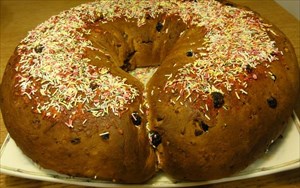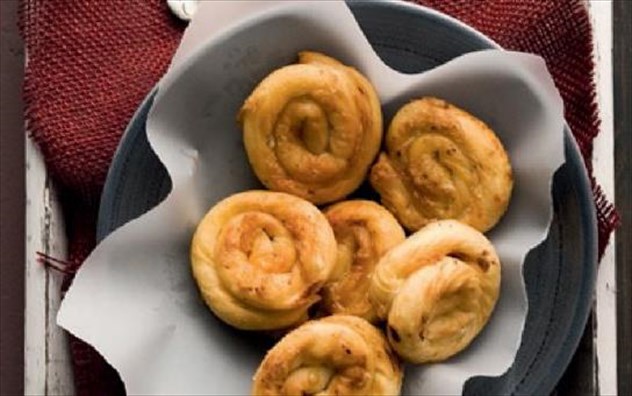Cake with figs, typical for the region of Macedonia
Each geographical area in Greece has its Christmas traditions. Maybe even each village keeps its own delicious secrets for the holidays. Here we present five different and delicious customs from different parts of Greece.
Pig slaughtering
Pig slaughtering is one of the most common Christmas customs, typical of different regions of Greece.
According to custom, the family buys the pig in May, and feeds him with bran, pumpkin and remains of food. The preparation of the pig slaughtering is meticulous and it is a feast for the whole family and the neighbourhood.
 Usually the pig is slaughtered 5-6 days before Christmas, on the eve of Christmas in some regions, and on 27 December elsewhere. Actually, the process is a strictly observed ritual. According to tradition, the housewife gives the slaughterer some ash and incense. After burning the incense, the slaughterer scatters it along with the ash on the neck of the pig to get a blessing. In many places, a small cross of blood is usually made on the foreheads of the children for luck.
Usually the pig is slaughtered 5-6 days before Christmas, on the eve of Christmas in some regions, and on 27 December elsewhere. Actually, the process is a strictly observed ritual. According to tradition, the housewife gives the slaughterer some ash and incense. After burning the incense, the slaughterer scatters it along with the ash on the neck of the pig to get a blessing. In many places, a small cross of blood is usually made on the foreheads of the children for luck.
A feast with wine and brandy follows the pig slaughtering as well as the process of preparation of sausages; the people remove and cut the meat, salt some of it and prepare part of it on the spot, cooking it with leeks and celery, which is perhaps one of the most distinctive festive Greek dishes.
Koukoulomaergia (a kind of soup)

Koukoulomaergia is a kind of soup made with corn, beans and wheat, which the residents of the island of Naxos serve during New Year feasts, hoping that this will bring luck to the farmers and their labour. They prepare the soup by boiling the corn, wheat and beans until they become mushy and serve it with lots of black pepper and olive oil.
Cake with figs
Preparing a Christmas bread is a very common Greek tradition, typical of many areas of Greece. This is actually a simple round bread, on which a cross of dough is formed.
One version of the classic Christmas bread is the cake with figs, which is typical of the region of Macedonia. Actually, this kind of sweet bread resembles the bread with raisins, as it is made with dark raisins and dried figs.
The bread is prepared with yeast, olive oil, water, flour and salt, and then subsequently you have to add the raisins and figs. The cross of dough is a compulsory element of the cake with figs as, according to tradition, it brings happiness, luck and prosperity.
Christmas bread from Zakynthos
 Zakynthos has a local custom, partially observed today, which involves the preparation of aromatic bread shaped as a ring, with nearly 15 ingredients. A coin is usually put inside it, which brings luck to the one who finds it on Christmas Eve.
Zakynthos has a local custom, partially observed today, which involves the preparation of aromatic bread shaped as a ring, with nearly 15 ingredients. A coin is usually put inside it, which brings luck to the one who finds it on Christmas Eve.
Such bread is usually prepared before every major holiday of the year, such as Christmas, Easter and on the eve of weddings. This is a kind of sweet bread, smelling of cinnamon, cloves and anise.
According to tradition, on Christmas Eve, the residents of Zakynthos eat cooked broccoli, observing the fast to receive Holy Communion at Christmas, and then, the eldest person in the family breaks the Christmas bread with the coin into pieces.
The Christmas bread is made with flour, yeast, water and red wine, and when the dough is ready, raisins, walnuts, sugar, orange juice, mandarin zest, cloves, cinnamon and anise are usually added to it.
Platseda (a kind of baklava)

The residents of the island of Mytilene prepare for the Christmas holidays a variety of baklava called platseda, observing this tradition to this day. Actually, these are small cakes with nuts and syrup. Usually, housewives made platseda on Christmas Eve, while sitting cross-legged at low round tables. Each cake is shaped as a shell, like the curved patties typical of the island of Skopelos, and steeped in syrup made from water, sugar and vanilla.